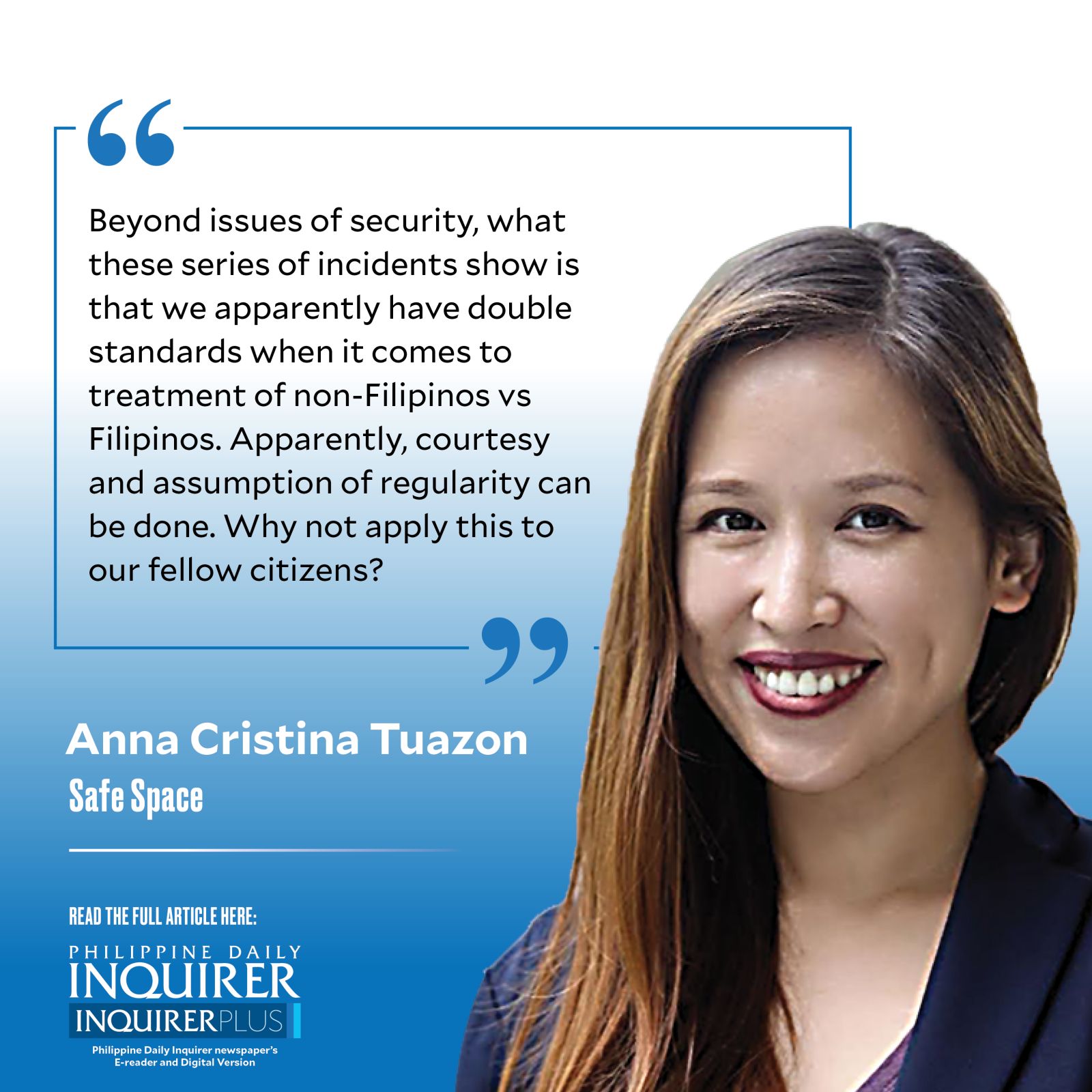Double standards
With rising tensions over the West Philippine Sea, people have been wary about infiltration by foreign nationals. We have seen the Senate hearings with Bamban Mayor Alice Guo who apparently secured an elected government post without much of a background to speak of. We have heard public concerns over the supposed influx of Chinese students in a university in Cagayan. News reports have shown arrests of Chinese nationals found with weapons in their compounds, not to mention the longstanding issue with Philippine offshore gaming operator serving as fronts for human trafficking. I write this with a bit of trepidation as such issues can be muddled by racism. It is easy to paint it black and white, with “foreigners = bad.” We must remember, however, that bad actors in these issues do not just come from foreign lands; they are aided and abetted by Filipinos in positions of authority and by political structures that make it easy for them to hide inside loopholes. Filipinos are angry partly because it exposes self-defeating double standards.
When it comes to Filipinos, immigration policies presume assumption of guilt and untrustworthiness. We are the only democratic country that requires so much documentation and paperwork in order to simply exit the country. A visa and flight ticket is not enough; proof of funds and income (and according to some reports, yearbooks and diplomas) are required. Such requirements belie an assumption, that unless proven otherwise, we are planning to engage in illegal behavior (i.e., overstaying) in other countries.
Yet here we see news of leniency when it comes to the entry of foreign nationals. Out of 24,189 student visas issued by the Bureau of Immigration (BI) last year, 16,200 of them were Chinese nationals who entered the country as tourists. This means that instead of applying for a student visa in their country of residence, they go here first and then attempt to convert their tourist visas into student visas. This visa pathway does not make logical sense. Enrolling in a university requires preparation; it is never spontaneous or impulsive. It requires gathering of requirements to apply for admission, followed by months of waiting for the results, then more requirements for enrollment. Any student who has applied for college knows this process is tedious. So why would we see a need for a tourist to convert their visa? Do we envision a tourist getting so enamored with our universities that they apply immediately and somehow have brought all their documents with them, including their transcripts?
BI also admitted that they granted 1,516 student visas to Chinese nationals in Cagayan, though only 485 of them are enrolled as of April. So where are the more than a thousand student visa holders? Have they all deferred their admission? Out of the 485, only 96 are attending on-site with the rest engaged in distance learning. At the very least, the BI is not very good at monitoring if student visa holders are using the visas for their intended purpose.
Another double standard here is how hard it is for a Filipino to secure a student visa abroad. Back in 2008, I experienced applying for a student visa in the United States embassy. We all waited for hours in a long line where interviews happened right in front us, within earshot. I heard “visa denied” so many times before it was my turn that I got clammy and nervous, despite holding a school acceptance letter. Getting a school acceptance itself was no walk in the park. One had to take a standard exam. Transcripts had to be requested and translated. Letters of recommendation had to be sought. Finally, if one was lucky, one underwent an interview. Despite such rigors, one’s dreams can still be dashed by the visa process. I heard so many people getting denied for a visa despite acceptance simply because they didn’t have “sufficient ties” to the Philippines. (I was only approved because I argued that the degree I was pursuing did not exist in my country.)
I am sharing this experience not because I want to adopt the overly stringent American process. I am highlighting how Filipinos get discriminated by others already and it seems that we are discriminating against ourselves, too. Domestically, we require so much documentation from Filipinos, such as requiring two valid IDs for every governmental transaction (as if one valid ID isn’t, well, valid). Yet reports have come in about foreign nationals showing obviously fraudulent documents and still being given visas.
Beyond issues of security, what these series of incidents show is that we apparently have double standards when it comes to treatment of non-Filipinos vs Filipinos. Apparently, courtesy and assumption of regularity can be done. Why not apply this to our fellow citizens?
—————-
aatuazon@up.edu.ph





















